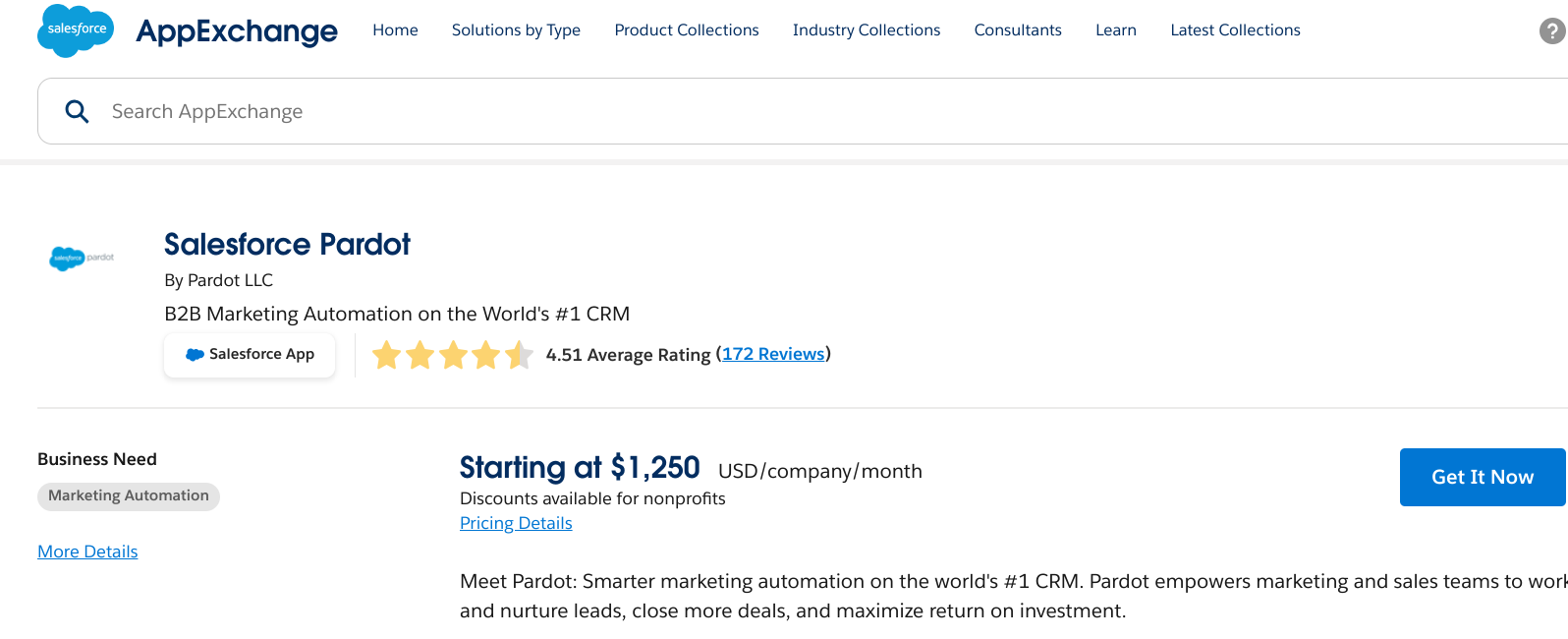Understanding Pardot: Salesforce’s B2B Marketing Automation Tool
Pardot, a key component of Salesforce’s comprehensive business solutions, was designed specifically with business-to-business (B2B) marketing in mind. It functions as a robust marketing automation tool that takes the efficiency and effectiveness of B2B marketing campaigns to a new height. Pardot enables businesses to create, deploy and manage online marketing campaigns from one central platform, thus streamlining their marketing efforts and maximizing ROI.
Through this platform, businesses are able to drive more leads, expedite pipeline sales and understand the impact of their marketing efforts. Pardot’s capacity for customization allows businesses to tailor marketing content to better meet the individual needs and interests of their prospective clients. The end result is a highly personalized, targeted marketing campaign which significantly improves conversion rates. A potent blend of powerful features, ease-of-use, and integration with Salesforce CRM make Pardot an indispensable tool for any B2B marketer.
The Core Functionalities of Pardot
In the realm of B2B marketing, Pardot sets a high bar by offering an extensive range of tools designed to cover all aspects of the marketing process. It accomplishes this through a comprehensive suite of functionalities tailored towards automating tasks, personalizing interactions, generating leads, and managing customer relationships. These functionalities are designed not only to increase efficiency, but also to better target marketing efforts, ensuring they are strategically placed to capture the most relevant audience.
One of Pardot’s significant functionalities is its robust lead management system, ensuring that no potential customer slips through the cracks. It offers intelligent lead scoring and grading, identifying the prospects most likely to convert and giving marketing teams a clear focus. Moreover, Pardot’s email marketing capabilities integrate seamlessly with the lead management system, enabling the creation and dissemination of personalized emails based on recipient preferences and behaviors. It’s worth noting that Pardot isn’t simply a tool but a powerful ally, one which intrinsically understands the nuances of your marketing strategy and works tirelessly to realize your business’s full potential.
The Role of Pardot in Lead Generation
Pardot, Salesforce’s renowned B2B marketing automation tool, plays an instrumental role in the process of lead generation. This platform strategically nurtures potential clients by gradually heightening their awareness and interest in your products or services, thereby aiding in the progression from qualified leads to loyal customers. With an in-built scoring and grading feature, Pardot assesses prospects based on their interaction with your company’s online content and scores them accordingly, enabling your sales team to focus their efforts on higher potential leads.
Within the realm of lead generation, Pardot’s ability to automate nurturing campaigns has been a game-changer. By using a pre-set series of emails based on unique customer behavior, it saves precious time and effort while ensuring personalized engagement with potential customers. Furthermore, it carries out A/B testing on emails, making data-driven decisions to optimize campaign performance. With its multi-channel approach including email, social media, and paid advertising, Pardot effectively amplifies the span and depth of your reach to potential customers.
Exploring the Features of Pardot for Email Marketing
Pardot’s robust suite of email marketing features allows businesses to streamline and enhance their communication efforts. This automation tool facilitates the creation of professional, personalised emails through intuitive templates and a user-friendly design editor. It helps marketers track email engagement through a comprehensive array of metrics including open and click-through rates, website visits, and more. This data can help form the basis for refining the email campaign to optimise conversions and engagement.
In addition, Pardot offers advanced email testing features that enable marketers to evaluate the functionality and effectiveness of their emails before they are sent out. This includes SPAM analysis and rendering tests across different devices and email clients to ensure the email appears as intended to all recipients. Along with these, the platform’s lead nurturing tool allows for the development of targeted emails based on insights gained from the prospects’ behaviour and interactions. These features collectively enhance the marketing team’s ability to effectively communicate with prospects and guide them through the sales funnel.
Pardot and CRM Integration: Enhancing Sales Efficiency
When Pardot is integrated with a customer relationship management (CRM) system, it wields the power to revolutionize a company’s sales efficiency. The amalgamation of these two robust technologies results in a synchronized system that effectively combines the marketing and sales efforts of a business. It aids sales teams in smart decision-making by providing them with better clarity about prospective clients based on their engagement with marketing campaigns. This consequently ensures the delivery of targeted sales efforts, making the entire process more productive and time-efficient.
One of the most noteworthy benefits of this integration is the enhanced qualification of leads. Pardot furnishes sales representatives with detailed insight into a lead’s behavior, including past interactions and engagement patterns. When this data is incorporated into the CRM system, it provides a comprehensive view of each lead, enabling sales teams to prioritize high-quality leads and plan strategies accordingly. The interplay between Pardot and a CRM facilitates streamlined operations and informed decision-making, significantly impacting sales efficiency.
How Pardot Facilitates Personalized Customer Interactions
Pardot shines prominently in the realm of personalized customer interactions. Its sophisticated automation features enable businesses to target prospects with customized content, tailored specifically to meet their unique interests and needs. Through a multi-channel approach encompassing email, social media, and on-site messaging, messaging can be finely tuned to be engaging and personally relevant. The level of personalization facilitated not only fortifies existing customer relationships but also successfully captures the attention of potential leads.
Furthering such efficiencies, Pardot empowers businesses to nurture leads with personalized drip campaigns. These automated programs allow for periodical dispatch of custom content, meticulously engineered based on the recipient’s behavior and engagement pattern. Significantly, this mechanism ensures that the right message lands to the right person at the right time. Consequently, the effectiveness of outreach programs is tremendously amplified, thereby fostering stronger customer interaction and broadened brand presence.
Insightful Reporting and Analytics with Pardot
Pardot’s robust reporting and analytics capability stands as a distinguishing factor in an era where data drives decision-making. It provides a comprehensive suite of analytical tools that can help marketers and business owners better understand their customers, track marketing performance, and measure the return on their investment. Users can effortlessly generate custom reports or utilize the pre-configured ones based on their needs, hence achieving a holistic visibility into their marketing campaigns.
Moreover, Pardot’s advanced analytics delve beyond the surface level, offering a deep insight into the prospect’s journey, starting from initial engagement to conversion. These insights help refine targeting strategies and optimize marketing efforts for improved effectiveness. This unparalleled level of detail not only reduces guesswork but also fosters a culture of data-driven decisions, promoting marketing campaigns that are both more effective and economical.
Pardot’s reporting and analytics offer numerous benefits:
• Comprehensive Analytical Tools: Pardot provides a wide range of analytical tools, allowing users to gain detailed insights into their customers’ behavior. This helps in creating effective marketing strategies tailored to the needs and preferences of the target audience.
• Customizable Reports: Users can generate custom reports based on their specific requirements or use pre-configured ones for quick analysis. This flexibility enables businesses to have a comprehensive view of their marketing campaigns, thereby aiding in informed decision-making.
• Deep Insights into Prospect Journey: Pardot offers in-depth analysis of each prospect’s journey from initial engagement to conversion. These insights help marketers refine targeting strategies and optimize marketing efforts for improved effectiveness.
• Data-Driven Decisions: The high level of detail provided by Pardot eliminates guesswork, fostering a culture where decisions are driven by data rather than intuition or assumptions. This results in more efficient and cost-effective marketing campaigns.
In conclusion, with its powerful reporting and analytics capabilities, Pardot empowers businesses to make strategic decisions that enhance customer engagement, improve campaign performance, and ultimately drive business growth.
Ease of Use: Navigating Through Pardot’s User Interface
Navigating through Pardot’s user interface is designed to be seamless, allowing both novice and experienced users to easily get acquainted with the workings of the platform. The dashboard is intuitively designed and properly labeled, allowing for the speedy location and execution of tasks. Additionally, Pardot’s interface supports customization, providing a flexible work environment tailored to the unique needs and preferences of each user. It offers easy navigation which significantly reduces the time taken to perform operations, thereby boosting productivity and efficiency.
With an extensive range of marketing automation tools at hand, finding and using specific functionalities could be daunting. Fortunately, Pardot’s user interface structure has been carefully organized to mitigate potential confusion. The incorporation of search and advanced filter options further simplifies the task of locating specific tools or functionalities. Pardot’s interface, therefore, not only simplifies the user experience but also ensures optimal utilization of its rich resource of tools and functionalities.
The Impact of Pardot on Business Growth
Harnessing the power of Pardot can significantly influence overall business growth. This dynamic marketing automation tool provides a multitude of services, such as lead generation, email marketing, CRM integration, and robust analytic reporting, all of which serve to streamline marketing efforts and enhance customer engagement. By automating and optimizing these core marketing tasks, businesses can achieve a more efficient and productive marketing strategy, which in turn, can drive increased sales, revenue growth and retention rates.
Additionally, Pardot’s ability to deliver personalized customer interactions helps businesses stand out in an increasingly competitive marketplace, where customized experiences often serve as a key differentiator. By leveraging these features, businesses can both attract new customers and foster deeper relationships with existing ones, ultimately leading to higher levels of customer loyalty and repeat business. In this way, Pardot not only augments immediate sales and revenue, but also contributes to long-term, sustainable business growth.
Investing in Pardot: Evaluating the Return on Investment.
Businesses planning to invest in Pardot need to conduct a comprehensive return on investment (ROI) analysis to validate their decision fully. This analysis involves comparing the financial rewards the platform offers, such as increased lead conversion rates, revenue growth, improved sales efficiency, and more personalized customer interactions, against the capital and operational costs of procuring and utilizing Pardot services.
One key metric that businesses tend to examine in their ROI calculations is the monetary value of the enhanced lead generation and nurturing capacity offered by Pardot. For instance, using the tool’s superior data analytics capabilities, companies can gain invaluable insights into prospect behavior, enabling more effective segmentation and targeted marketing campaigns. Another important facet of the ROI evaluation is measuring the impact of integrating Pardot with existing CRM systems. This integration bolsters efficiency and productivity by harmonizing marketing and sales efforts, which can play a vital role in boosting the bottom line. Accurate assessment of these metrics gives a clearer picture of the financial gains Pardot can bring to an organization.
What is Pardot and how does it relate to Salesforce?
Pardot is a marketing automation tool designed specifically for B2B companies and is part of the Salesforce suite of business solutions. It integrates seamlessly with Salesforce’s CRM system, allowing for more efficient sales processes and improved marketing efforts.
What are the core functionalities of Pardot?
The core functionalities of Pardot include lead generation, email marketing, CRM integration, personalized customer interactions, insightful reporting and analytics, and a user-friendly interface.
How does Pardot contribute to lead generation?
Pardot plays a key role in lead generation through its advanced tracking and scoring features. It helps businesses identify high-quality leads and nurture them through targeted marketing campaigns.
What features does Pardot offer for email marketing?
For email marketing, Pardot offers features like email automation, list segmentation, dynamic content, A/B testing, and comprehensive reporting. These features help businesses create personalized and effective email marketing campaigns.
Can you explain how Pardot enhances sales efficiency with CRM integration?
Pardot enhances sales efficiency through its seamless integration with Salesforce CRM. The integration allows for automatic syncing of leads and contacts, real-time alerts for sales reps when leads take certain actions, and the ability to track and measure marketing ROI directly within the CRM.
How does Pardot facilitate personalized customer interactions?
Pardot facilitates personalized customer interactions through its automation capabilities. It allows businesses to create personalized content and messages based on a customer’s interactions, ensuring that customers receive the most relevant information at the right time.
What kind of reporting and analytics does Pardot provide?
Pardot provides comprehensive reporting and analytics features, allowing businesses to track the effectiveness of their marketing campaigns. These reports provide insights into aspects like lead generation, email marketing performance, and ROI.
How user-friendly is Pardot’s interface?
Pardot’s user interface is designed to be straightforward and easy to navigate. It provides a clear view of marketing automation workflows, lead scores, and campaign performance, enabling users to manage their marketing efforts efficiently.
What impact does Pardot have on business growth?
By streamlining marketing efforts and providing valuable insights, Pardot can significantly impact business growth. It helps businesses generate more high-quality leads, improve their conversion rates, and ultimately increase their revenue.
How can the return on investment in Pardot be evaluated?
The return on investment in Pardot can be evaluated by measuring its impact on lead generation, sales efficiency, and overall business growth. Its comprehensive reporting and analytics features also provide valuable data for measuring ROI.




